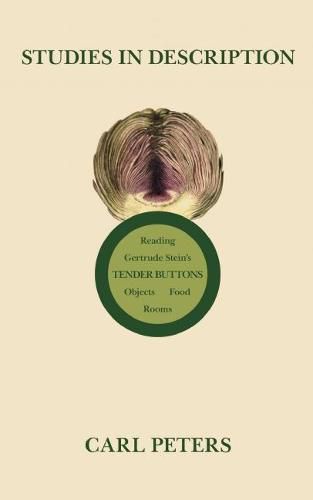Readings Newsletter
Become a Readings Member to make your shopping experience even easier.
Sign in or sign up for free!
You’re not far away from qualifying for FREE standard shipping within Australia
You’ve qualified for FREE standard shipping within Australia
The cart is loading…






Difficult writing has its way of illuminating the part of the world that counts. One such difficult text is Gertrude Stein’s highly experimental Tender Buttons: objects, food, rooms - long considered the single most groundbreaking literary work of twentieth-century art, literary criticism, and art history. One hundred years since publication, Carl Peters offers a sustained reading of the 1914 edition, responding to the eccentric sounds and rhythms of this long prose-poem with annotations that bring understanding, in particular, to the composition’s syntax, which is noted for its defiance of conventional norms; for example: ROAST POTATOES. Roast potatoes for. [Annotation] Grounded! Such annotations demonstrate that an apprehension of Stein’s whole art comes from the project and praxis of reading the work literally, actually. Read her with her for less, she asserts. Translate more than translate the authority.
In Studies in Description: Reading Gertrude Stein’s Tender Buttons, Peters demonstrates ways in which Stein’s thought questions everything, underlining reasons that her work has long served as the wellspring for generations of experimental poets, inspiring Language movement poets such as bill bissett, bpNichol, and George Bowering, and novelists such as William Gass, Sherwood Anderson, and Ernest Hemingway. The Modernist work Tender Buttons can be used to show how in the early twentieth century Stein and others helped us discover a different world in our midst, a moment of the Modern.
$9.00 standard shipping within Australia
FREE standard shipping within Australia for orders over $100.00
Express & International shipping calculated at checkout
Difficult writing has its way of illuminating the part of the world that counts. One such difficult text is Gertrude Stein’s highly experimental Tender Buttons: objects, food, rooms - long considered the single most groundbreaking literary work of twentieth-century art, literary criticism, and art history. One hundred years since publication, Carl Peters offers a sustained reading of the 1914 edition, responding to the eccentric sounds and rhythms of this long prose-poem with annotations that bring understanding, in particular, to the composition’s syntax, which is noted for its defiance of conventional norms; for example: ROAST POTATOES. Roast potatoes for. [Annotation] Grounded! Such annotations demonstrate that an apprehension of Stein’s whole art comes from the project and praxis of reading the work literally, actually. Read her with her for less, she asserts. Translate more than translate the authority.
In Studies in Description: Reading Gertrude Stein’s Tender Buttons, Peters demonstrates ways in which Stein’s thought questions everything, underlining reasons that her work has long served as the wellspring for generations of experimental poets, inspiring Language movement poets such as bill bissett, bpNichol, and George Bowering, and novelists such as William Gass, Sherwood Anderson, and Ernest Hemingway. The Modernist work Tender Buttons can be used to show how in the early twentieth century Stein and others helped us discover a different world in our midst, a moment of the Modern.